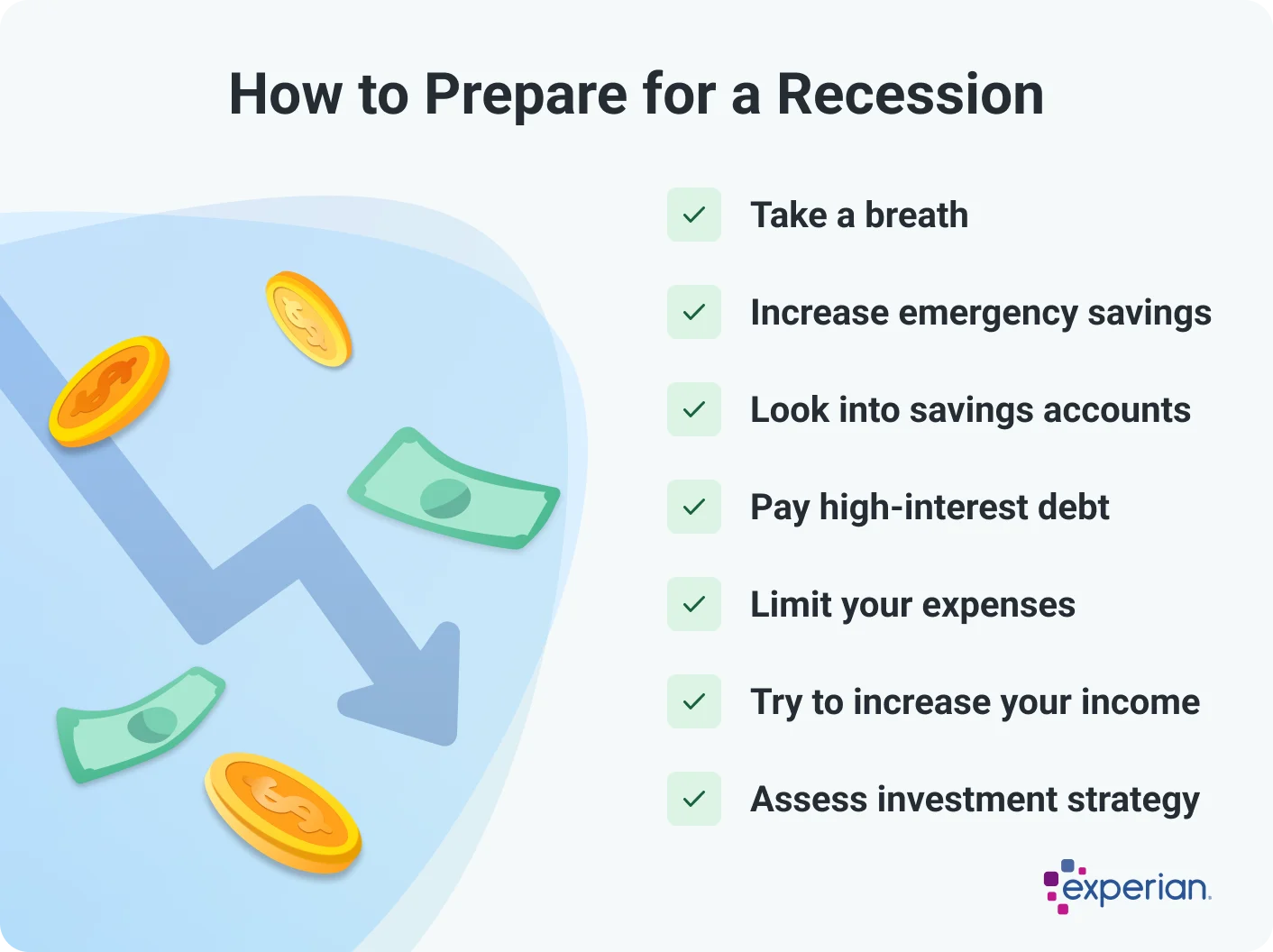How to Prepare Your Finances for a Recession
Quick Answer
To ready your finances for a recession, strengthen your emergency savings, pay down high-interest debt and review your investment portfolio to make sure it’s aligned with your goals.

To ready your finances for a recession, start by strengthening your emergency savings, paying down high-interest debt and reviewing your investment portfolio to make sure it's aligned with your goals.
While market volatility and talk of an impending recession are stressful, that doesn't mean you should immediately make big changes to your investments or financial plan. A recession may not happen at all, after all. For most people, staying the course and staying invested through an up-and-down market is the right call.
But continued uncertainty may still have an effect on the economy. It's always smart to strengthen your financial stability and prepare for possibilities like layoffs, interest rate cuts and—especially if you're nearing retirement—stock market dips. Here's what to do in the months when economists say a recession might be near, or even currently underway.

1. Take a Breath
First, try not to panic: A significant downturn is not inevitable. While there is economic uncertainty around things like tariffs, policymakers in Washington are motivated to take steps to prevent a recession.
That said, markets do not take kindly to uncertainty. During times of volatility, it's wise to prepare for your 401(k) and other investment accounts to fluctuate in the coming months. If this starts to happen, take a deep breath and know that the stock market has historically recovered in the long run. According to research from investment firm T. Rowe Price, investor portfolios with a mix of 60% stocks and 40% bonds recovered two years after each extended market downturn since 2000 (and just four months after the pandemic-induced downturn in 2020). And over the past decade, the S&P 500 has had an average annualized return of 9.76%, even with ups and downs in the market. Your finances might seem unstable now, but they won't stay that way forever.
Learn more: Financial Do's and Don'ts to Follow During a Recession
2. Increase Your Emergency Savings
The best way to prepare for a recession, or any economic turmoil, is to up your emergency savings. If you or someone in your family loses their job, you'll need to be able to tap savings to cover the bills. Having extra funds for an emergency is a key financial strategy during the best of times, but can become all the more essential in an economy where the price of goods is going up and jobs may become more scarce.
Popular advice suggests saving three to six months' worth of necessary expenses in your emergency fund. Consider setting aside more if you're the sole breadwinner or your income is especially unpredictable. If you're not sure where to get the extra money to put in your emergency fund, try cutting back on expenses (more on that below) or using your tax refund to beef it up.
Learn more: How Much Money Should You Have in Your Emergency Fund?
3. Choose the Right Savings Accounts
The Federal Reserve may cut interest rates this year, but it's unclear when, since regulators aren't sure yet how tariffs will affect the economy. Some experts aren't expecting a rate cut until September 2025. While you can't control what the Fed does, you can maximize the interest you could earn on your savings now.
Here's how: If the Federal Reserve lowers the federal funds rate, interest rates across credit cards, mortgages and other loan types tend to come down—and your savings will also earn less interest. So while interest rates are higher now, consider putting your cash in a high-yield savings account or an even higher-rate money market account or certificate of deposit (CD). That will let your savings work harder for you. And if you're thinking about taking out a loan, consider waiting to do so until rates come down.
Earn Money Faster
Compare high-yield savings accounts
Find a high-yield savings account with today’s APY. Compare current APY and offers to find the best savings account for you.
4. Pay Down High-Rate Debt
It's always a good idea to pay off debt, since it's a guaranteed way to save money you would have spent on interest charges. That can free up cash to put toward your emergency fund. Plus, if the Fed waits longer than expected to cut interest rates, you'll be doing yourself an even bigger favor by eliminating high-rate debt from your financial picture in the meantime.
Start by paying off the highest-interest debt you have, which is likely to be credit card debt, payday loans or personal loans (if you borrowed with a poor credit score). High-rate debt is commonly considered to be anything that carries an interest rate of 8% or higher. When the strength of the economy is looking murky, paying down debt can give you peace of mind, since you can focus your attention on saving instead.
Learn more: Paying Off Debt With the Highest APR vs. Highest Balance
5. Limit Your Expenses
Look for ways to save small amounts each month and potentially limit big purchases, especially if there are signs in your company or industry that your job may be at risk. Reducing expenses can also help strengthen your emergency savings, since you can immediately redirect what you were spending to your savings account.
A few ways to do it:
- Negotiate your bills, including insurance rates and utilities.
- Cook and plan meals more intentionally to save money on groceries.
- Audit your monthly subscriptions and cut back or downgrade to cheaper plans.
- Make use of rewards credit cards, such as cash back credit cards, to make purchases at a discount—and pay off your credit card bill each month to avoid debt.
Tip: If you don't feel comfortable negotiating your bills on your own—or you don't want to—a service such as Experian BillFixer™ can help reduce your bills without you having to do all the work.
6. Look for Ways to Increase Your Income
Diversify your income streams to limit the potential impact of a layoff, whether you're a freelancer or a salaried worker. You can try ways to make extra money from home, such as tutoring online or selling items you no longer use. You can also take on a side gig consulting or freelancing in your industry (for example, social media management for local businesses if you work in marketing).
There are many added benefits to increasing your income now, besides helping you save money and pay for a higher cost of living. If you do get laid off during a recession, it can take years to return to your pre-layoff salary. Full-time workers who lost their jobs during the Great Recession of the late 2000s and got another job earned 17% less on average two years later than before their layoff, according to research by the Brookings Institution.
7. Assess Your Investment Strategy
If you're nearing retirement or you're investing for other goals, take a look at your portfolios to see how much risk you're taking with your positions.
It's likely that if you're close to retirement, you're not taking on a lot of risk, meaning you're already less exposed to stock market fluctuations. Also, if you don't plan on needing your retirement or other investment funds for a long time, you can ride out any ups and downs and know the market will most likely recover. But if you're unsure whether your asset allocation is appropriate for your goals, reach out to a financial adviser, such as a certified financial planner (CFP), for help.
One unique feature of the current economy is the unexpected behavior of U.S. Treasury bonds. Early in April 2025, bond prices dropped as stock prices dropped, which isn't typical. If you're interested in other lower-risk investments that could limit potential volatility from Treasuries, you can add to your portfolio shorter-term Treasuries, known as T-bills, with maturities of one year or less. Short-term bonds typically hold their value better than long-term bonds when interest rates change.
Frequently Asked Questions
The Bottom Line
Recessions are named as such after at least a few months of "a significant decline in economic activity that is spread across the economy," according to the National Bureau of Economic Research (NBER). That means it's not always clear a recession is happening until we're in it. But individual indicators of a recession, such as limited growth, higher inflation, layoffs across industries and lower consumer spending, could happen independently of a true recession, and affect your finances nonetheless. Shore up your savings, assess your investments, pay down debt and add to your income so you're in the best position possible to ride out a downturn.
What makes a good credit score?
Learn what it takes to achieve a good credit score. Review your FICO® Score for free and see what’s helping and hurting your score.
Get your FICO® ScoreNo credit card required
About the author
Brianna McGurran is a freelance journalist and writing teacher based in Brooklyn, New York. Most recently, she was a staff writer and spokesperson at the personal finance website NerdWallet, where she wrote "Ask Brianna," a financial advice column syndicated by the Associated Press.
Read more from Brianna